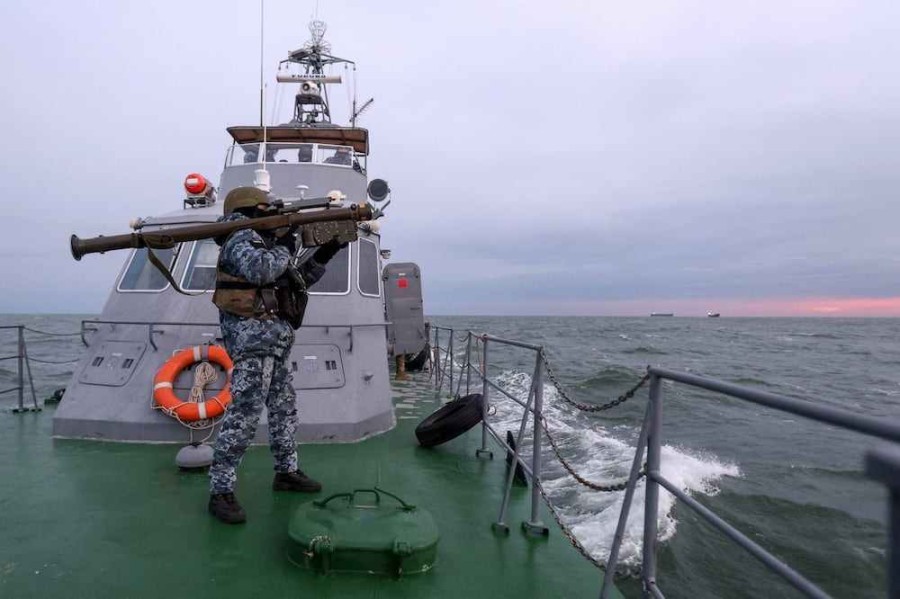Ukraine gets backing to build on Black Sea grain victory over Russia
06 March, 2024

Insurers are backing Ukraine to build on its Black Sea grain breakthrough by exporting more goods to boost its wartime economy.
Brokers in London are optimistic that the retreat of Russia's fleet in the face of Ukrainian sea drones and cruise missiles provides a “positive environment” for trade in the key corridor.
Insurers expand coverage for Ukrainian exports like steel and iron ore, expecting increased trade after Ukraine's success against Russia in the Black Sea. This move aims to cut insurance costs and bolster revenue for Ukraine's war-torn economy.
As a result, an insurance scheme set up to assist Ukrainian grain exports will be widened to cover any civilian cargo, such as steel and iron ore, it was announced on Friday.
With Ukraine reliant on western aid to pay its bills, any rise in export revenue “gives us more opportunity to keep fighting” in the third year of war with Russia, said Economy Minister Yulia Svyrydenko. Once brought to a near-standstill by naval mines and a coastal blockade, Black Sea trade has bounced back after Ukraine's success in the “deep battle” against the Russian navy. Russian warships stationed in Sevastopol were forced to take cover on the other side of the occupied Crimean peninsula as Moscow sought to stem losses.
With insurance costs falling, hundreds of ships have sailed the western Black Sea, bringing grain exports to their highest level since the collapse of a UN-brokered deal last July.
The corridor has huge global ramifications because Ukraine is one of the world's top agricultural exporters, including to needy countries such as Lebanon and Afghanistan. The separate Red Sea crisis involving Houthi attacks on shipping has set back the recovery in Ukraine's exports.
A scheme known as Unity, in which brokers on London's heavyweight insurance market can apply to a $20 million compensation pot from Ukraine, is credited with allowing them to reduce premiums.
That in turn reduces costs for Ukrainian industry. The widening of the scheme to any non-military cargo was announced on Friday by insurer Marsh McLennan.
War risk insurance covers damage that would not be part of normal shipping coverage. No claims have been made since the scheme was launched in November.
Positive environment
“Originally there was a massive global humanitarian reason to do this. We're now moving beyond that,” said Marcus Baker, Marsh McLennan's head of marine and cargo.
With insurers hopeful that Ukraine's military will continue to ensure a “positive environment” in the Black Sea, the aim is to reduce costs for exporters, Mr Baker said.
“It's not that goods aren't being exported. They are, but they're being exported at a price that is not prohibitive, but it's expensive,” Mr Baker said.
“What we're trying to do here is make sure that those goods can still continue to be exported but at a much cheaper rate on the war risk [premiums] than they have been paying to date.”
Ukraine's priorities are to export more steel and iron ore, although the expanded scheme could also be used to cover container ships and other cargo. Steel production last year was down by 70 per cent compared to the pre-war economy.
Any extra revenue could be put towards the war effort, because financial aid from the West only covers domestic social spending, said Ms Svyrydenko, who is also a Deputy Prime Minister of Ukraine.
While US aid hangs in the balance, Russia is directing an estimated 6 per cent of its economic strength into its armed forces, putting pressure on Ukraine to respond.
“We're not able to cover our military needs. To do so, we need to be able to mobilise our internal resources like taxes, export revenues and dividends from state-owned enterprise,” Ms Svyrydenko said.
“It means that exporting all the steel, iron ore and other processed goods gives us more opportunity to keep fighting and keep working.”
Source: www.thenationalnews.com
